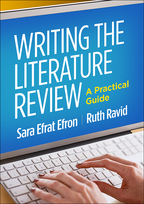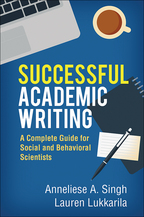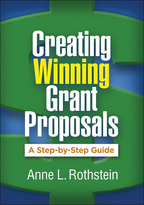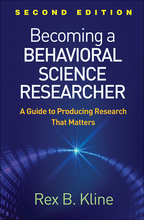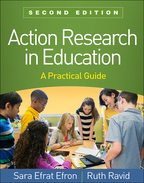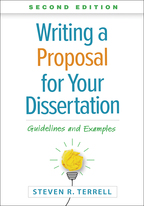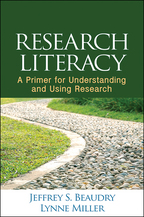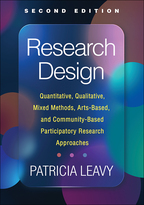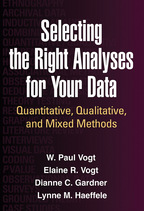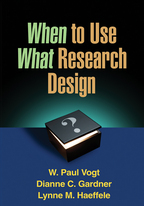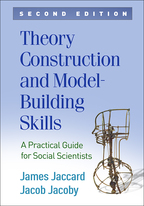Writing the Literature Review
A Practical Guide
Sara Efrat Efron and Ruth Ravid
HardcoverPaperbacke-bookprint + e-book
Hardcover
orderNovember 14, 2018
ISBN 9781462536900
Price: $68.00 298 Pages
Size: 7" x 10"
Paperback
orderNovember 23, 2018
ISBN 9781462536894
Price: $45.00298 Pages
Size: 7" x 10"
“Sometimes, wishful thinking comes too late in life….This easy-to-read, user-friendly book with step-by-step guides would have made an excellent companion for my experiences, both as a research writer and as an instructor….Efron and Ravid, like trailblazers and guides, have mapped out the whole process of research writing in easy steps in their book, Writing the Literature Review—making it easier and more comprehensible for researchers. They have defined parameters of each and every step of the journey….There is an abundance of information out there on literature review writing, but Efron and Ravid’s book…is more distinct and conspicuous from the rest because of the simplicity with which this book is developed. I would highly recommend this easy-to-read book to all the instructors who teach Research Writing courses, and to all the graduate and doctoral students who are venturing out on their journey of the literature review writing processes.”

—Inquiry in Education
“The clarity of the text is a strength. The tables and examples of various orientations and approaches are very helpful, especially if students have heard critical comments about other academic areas’ research methods. The chapter on developing arguments and supporting claims (which includes common mistakes to avoid) is particularly instructive. I plan to begin using the book immediately—it is thorough, well written, and will be meaningful to graduate students and professionals.”

—Marsha Harman, PhD, Psychology Program, Sam Houston State University
“This text adds a unique approach to writing the literature review; it is the only book on the topic that I have seen that connects the review to different research designs. As evidenced by the stories and scenarios throughout the book, it takes a learner-centered approach. I appreciate the use of graphic organizers as well as the chapter summaries in the form of numbered lists.”

—Joyce Pittman, PhD, School of Education, Drexel University
“This is a wonderful book that is a very user-friendly and effective tool to teach students how to complete a professional literature review. It is easy to follow and targeted toward readers at all academic levels. Each chapter contains simply stated content and great examples, templates, checklists, and group exercises. The checklists and group exercises will be particularly useful to incorporate into in-class work to strengthen student learning.”

—Kelli Larsen, PhD, Department of Social Work, Marshall University
“This is exactly the book my colleagues and I have been looking for. It thoroughly covers the processes that are important for students to grasp in conducting their literature reviews. Using this book will enable students to produce more rigorous and informed literature reviews than the basic summaries I often see. I like the figures that present information in a visual form as well as the ample examples, which set this book apart.”

—Stephanie J. Jones, EdD, College of Education, Texas Tech University
“A comprehensive, step-to-step guide, this book will be highly useful for master’s and doctoral students in social sciences and education. Students may feel intimidated by the task of writing a literature review, assuming they should already know how to do it and therefore not asking for guidance. The book could be used as a main textbook in academic writing classes or a supplementary source in research classes. It covers both fundamental issues, such as what a literature review is and what it is not, and more sophisticated topics—for example, the author’s voice and positionality, and the importance of revision.”

—Maja Miskovic, PhD, Professor of Research and Executive Director, Division of Research and Doctoral Programs, Concordia University Chicago
—Inquiry in Education
“The clarity of the text is a strength. The tables and examples of various orientations and approaches are very helpful, especially if students have heard critical comments about other academic areas’ research methods. The chapter on developing arguments and supporting claims (which includes common mistakes to avoid) is particularly instructive. I plan to begin using the book immediately—it is thorough, well written, and will be meaningful to graduate students and professionals.”
—Marsha Harman, PhD, Psychology Program, Sam Houston State University
“This text adds a unique approach to writing the literature review; it is the only book on the topic that I have seen that connects the review to different research designs. As evidenced by the stories and scenarios throughout the book, it takes a learner-centered approach. I appreciate the use of graphic organizers as well as the chapter summaries in the form of numbered lists.”
—Joyce Pittman, PhD, School of Education, Drexel University
“This is a wonderful book that is a very user-friendly and effective tool to teach students how to complete a professional literature review. It is easy to follow and targeted toward readers at all academic levels. Each chapter contains simply stated content and great examples, templates, checklists, and group exercises. The checklists and group exercises will be particularly useful to incorporate into in-class work to strengthen student learning.”
—Kelli Larsen, PhD, Department of Social Work, Marshall University
“This is exactly the book my colleagues and I have been looking for. It thoroughly covers the processes that are important for students to grasp in conducting their literature reviews. Using this book will enable students to produce more rigorous and informed literature reviews than the basic summaries I often see. I like the figures that present information in a visual form as well as the ample examples, which set this book apart.”
—Stephanie J. Jones, EdD, College of Education, Texas Tech University
“A comprehensive, step-to-step guide, this book will be highly useful for master’s and doctoral students in social sciences and education. Students may feel intimidated by the task of writing a literature review, assuming they should already know how to do it and therefore not asking for guidance. The book could be used as a main textbook in academic writing classes or a supplementary source in research classes. It covers both fundamental issues, such as what a literature review is and what it is not, and more sophisticated topics—for example, the author’s voice and positionality, and the importance of revision.”
—Maja Miskovic, PhD, Professor of Research and Executive Director, Division of Research and Doctoral Programs, Concordia University Chicago

